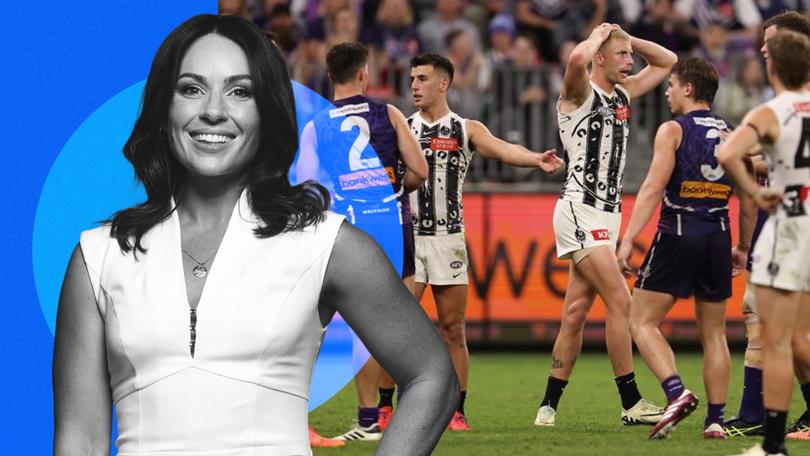GEORGIE PARKER: The Collingwood-Fremantle draw was a fair result, don’t shorten the game and ease up on umps

We love being dramatic and over-correcting in sport. Here are three things I’d love us to stop calling for in the AFL:
1. Extra time
You can see every commentator getting ready for it when it looks like it’s going to be a draw. The famous question pops up, “should we bring in extra time?” Absolutely not. A draw is a result.
Sign up to The Nightly's newsletters.
Get the first look at the digital newspaper, curated daily stories and breaking headlines delivered to your inbox.
By continuing you agree to our Terms and Privacy Policy.Over the past five years there has been an average of two draws a season, out of over 400 matches in a season – I’ve done the math and that’s not many.
If you can’t get a result in 120 minutes, you shouldn’t get the all the four points. In saying that, in such a close competition as we currently have, a draw in some ways can be as good as a win as it essentially nullifies the win-loss percentage for any team on the same amount of wins as you.
While you don’t get the maximum amount of points, it isn’t a nothing result like some suggest. And really, when you add it up, two draws are as good as one win, just look at Collingwood.
2. Shortened quarters
Weirdly, the same pundits who want extra time to get a result, want to shorten matches to minimise injuries.
We had shortened quarters during COVID which I hated.
It wasn’t long enough to see teams wear their opponent out, change on field tactics or produce high scoring matches stacked with goals.
I have experience in changing length of matches in hockey. We went from 35 minute halves in hockey to 15 minute quarters, essentially taking 10 minutes of playing time off the clock. I found the change so incredibly frustrating as a player.
It basically evened out the matches, but not in a good way.
Teams can only hold on for a certain period of time before fatigue, both mental and physical, come into play.
It is then, when there are holes in your opponent’s game plan that you get end-to-end ball movement.
If fatigue doesn’t set in, the weaker team can play defensively and hold on for dear life until the sweet sound of the quarter, half or full time siren goes.
In close matches, even when the teams are evenly placed, the end of the match is where the magic happens. We’ve had some thrillers this year including GWS’ win against Geelong in the dying moments on Saturday. In shortened quarters this doesn’t happen.
It is debatable if quarters are now longer, or whether things like score reviews, or in game factors such as waiting for ruckman to nominate have had an impact.
I’d like to see how many minutes per match are added by stoppages before worrying about quarter lengths.
3. Calls for umpires to umpire differently throughout the match
We need to stop asking the impossible of umpires. Do we want them to put the whistle away in the dying moments or do we want them to be brave and make the correct call that can change a game?
Umpiring really should be umpired in the first minute the same as the last minute, but it rarely is. For me, whatever sport I played, the umpiring just needed to be consistent throughout that match, knowing that each match could be umpired slightly differently than others.
All sports have such grey areas when it comes to their rules so every umpire will interpret them differently.
The frustration for me as a fan and as a player, is that when it gets to the end of the match, umpires are so terrified of being crucified they change how they umpire, and sometimes get it wrong. They are damned if they do and damned if they don’t.
